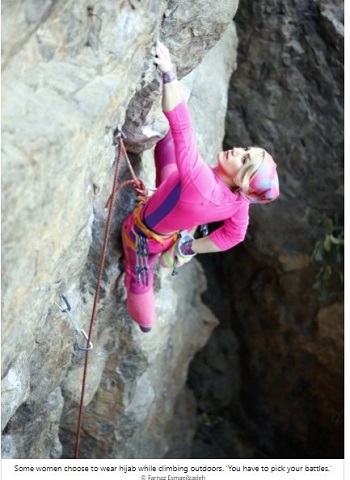From Explorer’s Web and UK Climbing
Reports of a violent confrontation and a temporary ban imposed on female climbers at a popular climbing and canyoning area in Iran raised eyebrows and voices on social media earlier this month. A video showed an individual attacking a group of canyoners in the recreational area of Dorcheh, near to the city of Isfahan and a pilgrimage site, who was angered by the participation of women.
IranWire reported that the Isfahan Mountaineering Board condemned the attack and offered legal assistance to the victims. However, following that, the Imam of the grand mosque in Dorche supported the attacker.
The unnamed climber continued to tell Climbing that the Imam said the men and women in the group were doing “dirty works” by traveling to the mountain together, and threatened Isfahan’s sport authorities “not to mess with Islamic culture”. He claimed that in this instance, the women were the “intruders”.
Following the confrontation, Isfahan’s mountaineering board banned women from local recreational sites in the interim as a precautionary measure, including Koohe Sefid sport crag, and encouraged female climbers to stick to indoor facilities instead until the situation is resolved.
Mehdi Nasr Esfahani, head of the Isfahan Mountaineering Board, responded by banning women from outdoor climbing in Dorche until the conflict is resolved. He has asked to meet with the Imam and other authority figures in the region to discuss building a new route to the climbing site. This would solely be for women to allow them to continue climbing.
Dorche has a population of around 50,000; the majority have strict religious beliefs. The climbing site is close to a pilgrimage site, so many are particularly sensitive about the area.
It is not the first time that climbers have endured hostility. Passersby regularly insult them and they have been asked to leave the area multiple times. The climbers have complained, but nothing has been done.
Climbing and mountaineering have become more popular with Iranian women, as it provides an escape from the restrictions placed on them in cities and towns. In 2003, it was ranked as Iran’s most popular women’s sport. Speaking to UK Climbing in 2016, Shirin Shabestari, an Iranian climbing instructor now based in the UK, said, “Down in the city, I was a girl being treated differently. When I went to the mountains with my Dad, I felt like an equal. The mountains suddenly offered a whole different world. A world where it was okay to let the scarf slip. To let the wind magically blow your hair around.”
The board is planning a new access route to the activity sites in the area alongside local governers and imams to create more separation between climbers, canyoners and local residents or pilgrims visiting the nearby cultural centre and Tomb of Unknown Martyrs.
 In a letter to the head of the board, deputy head Fatemeh Eftekhari criticised his response. “Restricting the training of women rock climbers in nature is a clear example of punishing athletes and confirming all recent accusations,” Ms. Eftekhari wrote, quoted on BBC Persian’s Instagram. “If you cannot support athletes, you should avoid narrowing the field for women.”
In a letter to the head of the board, deputy head Fatemeh Eftekhari criticised his response. “Restricting the training of women rock climbers in nature is a clear example of punishing athletes and confirming all recent accusations,” Ms. Eftekhari wrote, quoted on BBC Persian’s Instagram. “If you cannot support athletes, you should avoid narrowing the field for women.”
Paradoxically, relaxation of rules surrounding participation in sport by women has only been achieved through adhering to segregation and strict veiling policies. or some Iranian women, wearing hijab in order to be able to climb is a price they are willing to pay to avoid attracting attention and trouble. “You have to pick your battles,” one female climber said in response to the Dorcheh incident.
- Like
- Digg
- Del
- Tumblr
- VKontakte
- Buffer
- Love This
- Odnoklassniki
- Meneame
- Blogger
- Amazon
- Yahoo Mail
- Gmail
- AOL
- Newsvine
- HackerNews
- Evernote
- MySpace
- Mail.ru
- Viadeo
- Line
- Comments
- Yummly
- SMS
- Viber
- Telegram
- Subscribe
- Skype
- Facebook Messenger
- Kakao
- LiveJournal
- Yammer
- Edgar
- Fintel
- Mix
- Instapaper
- Copy Link









